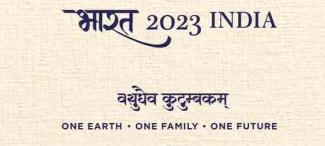Bharat or India? In Search for National Identity
Article 1 of the Constitution of India states that 'India, that is Bharat, shall be a Union of States', which is being used for the first time smartly as a political-cultural strategy by the highest authority of India. The term 'President of Bharat' has been used for the first time by replacing the usual 'President of India' in an official invite for a dinner hosted by President Murmu on September 9 for the dignitaries attending the G20 summit. Subsequently, the BJP spokesperson's tweet on September 5 reads, 'visit of Prime Minister of Bharat to Republic of Indonesia (20th ASEAN-India Summit and the 18th EAS Summit)' on September 7, has propelled speculative discourses, which are more intense than the debate in the Constituent Assembly on the name of country during the framing of the Constitution.
What has prompted a government with a comfortable majority in both the houses of Parliament (tacit understanding in Rajya Sabha) to tinker with anything and everything to resort to such secrecy in naming Bharat in a limited invitation and a spokesperson's tweet? Is it the mounting pressure from the emerging coalition of opposition political parties in Parliament- I.N.D.I.A. – (Indian National Democratic Inclusive Alliance) to compel the present government to use 'Bharat' to connect with 'the others' in rural? Or is it part and parcel of this government's ongoing decolonisation project (Project-D)? Or, will the government initiate a larger Constitutional Amendment process, no less than the 42nd Constitutional Amendment Act, including Article 1 in the coming Special Session of Parliament (September 18-22) before the General Elections?
No illegality or unconstitutional tinge exists in naming India as 'Bharat' in the President's invitation or the Prime Minister's itinerary to Indonesia. Neither is it confusion, as some opposition leaders have considered. The identity cards of the Indian officials at the G20 Summit on September 9-10 will also be reading 'Bharat - Official'. 'India, that is Bharat' in Article 1 allows both the usage. While in vernacular, local and regional, we use Bharat within our country with a sense of social-political-cultural connotation. It is only in English as India for the world as a political entity. No one would disagree that Bharat has a sense of meaning, understanding and belonging than India. However, India and Bharat in the Constitution have been unintentionally providing dual identity for us since the adoption of the Constitution. During classes, I intend to provoke students' arguments by deliberately mentioning 'Bharat, that is, India, shall be a union of states' rather than the obvious. As if 'India' represents the anglicised elites, mostly urbanised ones, 'Bharata' represents the rural habitants.
During the Constituent Assembly debate, the members of the drafting committee had deliberated at length on Article -1 with Namakaran (naming ceremony) of the newly born republic as Bharat, Hindustan, Hind, Bharatbhumi or Bharatvarsh, Jamboo Dwipay, Bharat Khand, Aryavarta, etc. While drafting member Govind Ballabh Pant advocated for 'Bharat Varsha' as the only name of new India, H V Kamath, another member, rued that the construction of 'India, that is Bharat' was somewhat clumsy. His submission during the debate was 'Bharat, or, in the English language, India, shall, be and such' had direct inspiration from the article of the 1937 Constitution of the Irish Free State that reads, 'The name of the State is Eire, or, in the English language, Ireland.' However, the drafting committee rejected Kamath's motion by 38 votes for and 58 against the motion. It approved Article-1 as it is today, in the last moment, as put forward by Ambedkar, who was not interested in a lengthy debate on the name, ‘India, that is Bharat, shall be a Union of States’.
In all probability, there will be limited domestic or international implications. While Indian in Germany, Indus in Kyrgyzstan and other Central Asian countries, Hindustan for many countries, and Hindia in Indonesia, the name Bharat won't be a major surprise for fellow countries of India. Soon, all Embassies and Consulate offices of India will ensure the familiarisation of the Bharat or mostly use interchangeably with India. As the Prime Minister travels to Indonesia, Bharat is somewhat phonetically familiar in Bahasa Indonesia. The word 'Bharat' means 'west' and seems to be derived from Bharat as the country is situated west of Indonesia.
From Parliament to passport, the Ashoka Emblem has given the 140 crores Indians a political identity. The speculation of massive activities of substituting India with Bharat domestically and internationally is neither necessary nor required. On the other hand, if this government can enact laws in Parliament with Hindi language or Sanskritise its foreign policies for the last nine years during the so-called ‘Amrit Kal’, substituting Bharat is an easy task. The problem lies in the transparency of adopting such smart nuances so far. Let's look forward to the Special Session of Parliament, for which the government has not shared any agenda so far. Despite the government's rejection of the amendment of Article-1, however, there is a high probability that the government may use its shock and awe strategy, as used in August 2019 to revoke Article 370 in Parliament, to introduce several amendments to the Constitution, including Article-1 and its related nearly more than 30 provisions in the Constitution. At best, this can be no less than the 42nd Amendment Act, which means revising several aspects of the Constitution.
The argument for the decolonisation project using Bharat rather than India has its technical limitations. The name India can be traced back to the Greeks' incursion into India, popularly known for the British colonial era. It may be argued that the government's Project-D is to eliminate anything external and adhere to indigenous. Thus, as Assam CM tweets, 'Republic of Bharat' sounds like somewhat cultural jetlag. The correct version would be 'Bharat Ganarajya'. Can the duality of Bharat and India in Article 1 be resolved by the government and oppositions in Parliament or in the coming General Elections?
